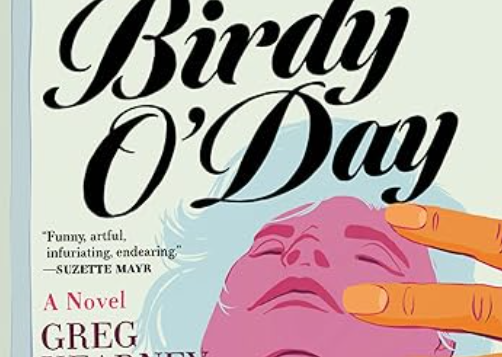 AN EVENING WITH BIRDY O’DAY
AN EVENING WITH BIRDY O’DAY
by Greg Kearney
Arsenal Pulp Press. 336 pages, $21.95
IN HIS GENTLY COMIC NOVEL An Evening with Birdy O’Day, Greg Kearney manages, among other things, to spin a poignant tale sustained over the course of sixty years, employing antiheros as the two main characters. Roland, our narrator, is never entirely in charge of his life, while his childhood friend Birdy fiercely controls his own life, Roland’s life, and that of anyone who lets him get away with it. As the novel begins, Roland is feeling every one of his 69 years, but is thrilled to learn that after 45 years his best friend—the once Grammy-winning now has-been Birdy O’Day—is scheduled to perform in their hometown of Winnipeg, Manitoba, for the first time. As guests of Mr. O’Day, Roland and his husband Tony will sit in the front row to witness Birdy’s talents before a paid audience.
In contrast to Roland’s forbearance, Birdy is a bossy, lonely ten-year-old fabulist. When Birdy weeps during a knock-down, drag-out fight between his parents, Roland observes: “I suddenly understood the ferocity of Birdy’s imagination: it was his only armour.” When Birdy’s mother dies from a stroke, Roland’s mother becomes his legal guardian. The boys then share a bed and consider themselves brothers, albeit brothers who kiss and snuggle and, at the tender age of ten, are improbably self-aware enough to know they’re gay. The first fifteen years of Roland and Birdy’s friendship make up the bulk of the narrative, from adolescence through adulthood. What it is about Birdy that keeps Roland in his thrall is not always clear—beyond the fact that Birdy was his first friend and first love. It almost seems as if Roland has imprinted on Birdy the way a duckling imprints on its mother.
One of Kearney’s strengths is his ability to create prickly yet appealing characters. The only anchor in Roland’s life is Margaret, his no-nonsense mother. A pugnacious atheist, she was once a devoutly religious sixteen-year-old who was raped. When we meet her, she’s ending a relationship with a messy alcoholic. Next she has a long-term relationship with a brusque and insecure woman who shows signs of being on the autism spectrum. Margaret is later diagnosed with multiple sclerosis, against which she wages a battle well into her late sixties. There is a tough-as-nails lesbian bar owner named Shit whose care and protection for Roland is unwavering. The boys’ new choir director is the dapper and patrician Caesar Stock, who takes a special interest in Birdy and Roland. They vie for his attention until they discover that he’s a bitter, cynical closet case.
At the center of everything is Birdy’s certainty that he will one day be famous for … something. What Roland and Margaret take as fanciful daydreaming, Birdy sees as fact. Birdy decides he will reach superstardom as a singer-songwriter (and he briefly succeeds). From now on, every move he makes, every person he allows into (or excludes from) his orbit, is justified as strategically advantageous to his career.
As the single-minded Birdy calculates his future success, it becomes inevitable that Roland will be left behind. Merely to pathologize Birdy O’Day as a malignant narcissist would fail to do justice to the full depth of a character as spectacularly selfish, driven, mercurial, disloyal, manipulative, neurotic, hilarious, and fragile as Birdy. One does feel for him, up to a point, and his selfishness can be entertaining, especially his dramatic precociousness as a child. His long slide into anonymity, however, does not arouse pity. Primarily it prompts sympathy for Roland, or frustration with Roland’s fatalistic acceptance of his perpetual status as a doormat.
Roland leads one to believe that his life is neither well-spent nor fulfilled, just a ripple in “the wake of Birdy’s ambition.” Yet Roland’s view of himself is belied by an important fact: he remains steadfast to his mother and his husband, always. One hopes there may be a moment of reckoning when he and Birdy reunite. Instead, it turns out age and distance have worked their magic and shrunk Birdy down to size. Robbed of his former power, he no longer controls much of anything. Roland’s response is mild bewilderment and indifference. In contrast to Birdy’s hard-fought life of misery, a life of loyalty and love doesn’t seem so bad.
Thomas Keith is professor of theater at Pace University in New York, as well as a writer and dramaturg.






